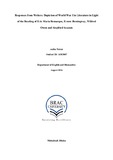| dc.contributor.advisor | Ahmed, Nawshaba | |
| dc.contributor.author | Nawar, Anika | |
| dc.date.accessioned | 2017-03-30T05:55:34Z | |
| dc.date.available | 2017-03-30T05:55:34Z | |
| dc.date.copyright | 2016 | |
| dc.date.issued | 2016-08 | |
| dc.identifier.other | ID 14303007 | |
| dc.identifier.uri | http://hdl.handle.net/10361/7977 | |
| dc.description | This thesis is submitted in partial fulfillment of the requirements for the degree of Bachelor of Arts in English, 2016. | en_US |
| dc.description | Cataloged from PDF version of thesis. | |
| dc.description | Includes bibliographical references (page 37-38). | |
| dc.description.abstract | Literature is shaped by many influences and war is one of them. Over the time war inspired many great literary works. However, no other event inspired this much literary works as World War I had. Literature began to change and evolve during and after World War I. Many authors of the time became disillusioned by the war and its aftermath, this destroyed their view and belief in traditional values. The amount of death and destruction they saw made them skeptic about everything. As a form of expressing this disillusionment and decay the writers broke new literary ground. The grief and despair caused by the war guided the writers towards modernist sentiment. This dissertation is an attempt to show the devastating impact of World War I, its literary representation and writers’ response to this profound human experience. This paper has attempted to examine some of these writers’ famous war literature to focus on the views they have expressed regarding war; their experiences during the war time and how those experiences forced them to speak up about these issues despite of strict political situation at that time. This paper has analyzed the work of four writers who wrote during the time of World War I. This research has focused on traditional war literature like the novels of Erich Maria Remarque and Ernest Hemingway and poetry of Wilfred Owen and Siegfried Sassoon to show how these writers wrote not only to record what they had seen and experienced but also to create a resistance against the glorification of war. The first chapter of this dissertation will look into how Remarque’s experience of this cataclysmic event urged him to write such novel that is well known as an anti-war novel and how aptly this novel has depicted the realities of the war. In order to gain different perspectives of writers on war and the impact of war the second chapter will look into Ernest Hemingway’s war literature. Followed by this, the third chapter will shed light on Wilfred Owen and Siegfried Sassoon to understand what prompt them to produce such profound anti-war novels and poetry despite of strict political situation during that time. After having read these authors of different background, style and nationality this study has found that World War I generated a platform, a unison where all the barriers transcended, the concept of nationalism, patriotism and bravery were redefined, challenged and thrown away. | en_US |
| dc.description.statementofresponsibility | Anika Nawar | |
| dc.format.extent | 38 pages | |
| dc.language.iso | en | en_US |
| dc.publisher | BRAC University | en_US |
| dc.rights | BRAC University thesis are protected by copyright. They may be viewed from this source for any purpose, but reproduction or distribution in any format is prohibited without written permission. | |
| dc.subject | Soldier’s Home | en_US |
| dc.subject | Literature | en_US |
| dc.title | Responses from writers: depiction of world war I in literature in light of the reading of Eric Maria Remarque, Ernest Hemingway, Wilfred Owen and Siegfried Sassoon | en_US |
| dc.type | Thesis | en_US |
| dc.contributor.department | Department of English and Humanities, BRAC University | |
| dc.description.degree | B.A. in English | |

